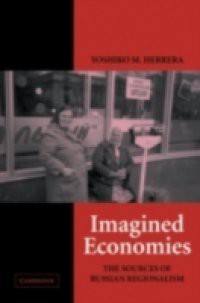This book examines the economic bases of regional sovereignty movements in the Russian Federation from 1990-1993. The analysis is based on an original data set of Russian regional sovereignty movements and the author employs a variety of methods including quantitative statistical analysis, as well as qualitative case studies of Sverdlovsk and Samara oblasts using systematic content analysis of local newspaper articles. The central finding of the book is that variation in Russian regional activism is explained not by differences in economic conditions but by differences in the construction or imagination of economic interests; to put it in the language of other contemporary debates, economic advantage and disadvantage are as imagined as nations. In arguing that regional economic interests are inter-subjective, contingent, and institutionally specific, the book addresses a major question in political economy, namely the origin of economic interests. In addition, by engaging the nationalism literature, the book expands the constructivist paradigm to the development of economic interests.

